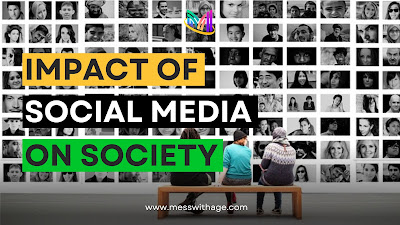Impact of Social Media on Society
Social media has become an integral part of modern society, shaping the way we communicate, interact, and perceive the world. With its unprecedented growth and influence, it has revolutionized various aspects of human life. This article explores the diverse impacts of social media on society, ranging from positive transformations to potential drawbacks.
Introduction
In the past decade, the advent of social media platforms has dramatically altered the digital landscape, reshaping the way people connect and share information. This article delves into the profound effects of social media on society, discussing its benefits, challenges, and future prospects.
The Rise of Social Media
2.1. Social Media Platforms and Popularity
Social media has witnessed a meteoric rise, with platforms like Facebook, Twitter, Instagram, and YouTube boasting billions of users worldwide. The ease of access and the ability to share content has made social media an indispensable part of daily life.
2.2. Influence on Communication Patterns
The way people communicate has undergone a significant transformation due to social media. Instant messaging, video calls, and real-time updates have made long-distance communication seamless and efficient.
Positive Impact of Social Media on Society
3.1. Connecting People Worldwide
Social media has become a powerful tool, breaking down geographical barriers and effortlessly connecting individuals from all corners of the world. It has facilitated cultural exchange and understanding, fostering a global community.
3.2. Promoting Social Causes and Awareness
Social media has emerged as a powerful tool for promoting social causes and raising awareness about various issues. Movements like #BlackLivesMatter and #MeToo have gained momentum through online platforms, sparking meaningful conversations and driving change.
3.3. Facilitating Business Growth and Entrepreneurship
Social media has provided businesses with a cost-effective platform to reach their target audience. It has empowered entrepreneurs and small businesses to showcase their products and services, fostering growth and innovation.
Negative Impact of Social Media on Society
4.1. Spread of Misinformation and Fake News
The rapid dissemination of information on social media has led to the rampant spread of misinformation and fake news. This poses significant challenges to the credibility of information sources and public understanding of critical issues.
4.2. Mental Health and Well-being Concerns
Excessive use of social media has been linked to mental health issues, including anxiety, depression, and loneliness. The pressure to conform to societal standards and the fear of missing out contribute to the mental health challenges faced by many users.
4.3. Privacy and Security Issues
Amassing extensive user data, social media platforms have given rise to concerns surrounding privacy and data security. The misuse of personal information and data breaches have become pressing issues in the digital age.
Impact of Social Media on Relationships
5.1. Family and Friends Connectivity
Social media allows people to stay connected with family and friends, regardless of physical distance. It enables real-time sharing of experiences, photos, and updates, fostering meaningful relationships.
5.2. Online Dating and Relationships
The rise of social media has influenced the dynamics of dating and relationships. Online platforms offer new avenues for meeting potential partners but also raise concerns about authenticity and trustworthiness.
Social Media and Politics
6.1. Political Campaigns and Activism
Social media has transformed the political landscape, playing a pivotal role in political campaigns and activism. Political leaders use platforms like Twitter to communicate directly with their constituents, while social media mobilizes the masses for various causes.
6.2. Echo Chambers and Polarization
The algorithmic nature of social media feeds can create echo chambers, where users are exposed only to information that aligns with their beliefs. Such tendencies can result in polarization and impede the progress of constructive discussions.
Impact on Education and Learning
7.1. eLearning and Online Resources
Social media has facilitated eLearning, offering access to educational resources and online courses. It has democratized education, making knowledge accessible to a broader audience.
7.2. Challenges and Opportunities
Despite its benefits, social media presents challenges in educational settings, such as distractions and academic integrity issues. Educators must harness its potential while addressing its drawbacks.
Social Media and its Effect on Youth
8.1. Cyberbullying and Online Harassment
Young individuals are particularly susceptible to the perils of cyberbullying and online harassment prevalent on social media platforms. Addressing this issue requires collaborative efforts from parents, educators, and platform providers.
8.2. Influence on Self-Image and Identity
Social media can impact young individuals' self-image and sense of identity. Comparisons to idealized portrayals on social media can lead to feelings of inadequacy and low self-esteem.
The significant contribution of social media in crisis management.
9.1. Natural Disasters and Emergency Response
Social media has emerged as a crucial platform during crises and natural disasters. It facilitates real-time updates and aids in coordinating rescue and relief efforts.
9.2. Social Media's Role in Spreading Awareness
Social media plays a pivotal role in disseminating information during emergencies, helping authorities reach a wider audience and raise awareness.
Social Media and the Business World
10.1. Social Media Marketing Strategies
Businesses utilize social media marketing strategies to engage with customers and enhance brand visibility. It enables targeted advertising and personalized communication.
10.2. Customer Engagement and Feedback
Social media allows businesses to interact directly with customers, gather feedback, and address concerns promptly. This fosters customer loyalty and improves products and services.
Social Media and Entertainment
11.1. Influencers and Content Creation
Social media influencers have gained significant popularity, impacting consumer behavior and trends. They create content that resonates with their followers and influences purchasing decisions.
11.2. Social Media as a Source of News and Entertainment
Many people turn to social media for news updates and entertainment content. However, the challenge lies in distinguishing credible sources from unreliable ones.
The Future of Social Media
12.1. Emerging Trends and Technologies
The future of social media is intertwined with emerging technologies like augmented reality, virtual reality, and artificial intelligence. These innovations will shape user experiences and engagement.
12.2. Ethical Considerations and Regulation
As social media continues to evolve, there is a growing need for ethical considerations and regulation. Balancing innovation with privacy and security concerns is vital for a sustainable digital future.
Conclusion
In conclusion, social media has undeniably impacted society in multifaceted ways. It has revolutionized communication, connected people across the globe, and empowered businesses. However, it also poses challenges like the spread of misinformation, mental health concerns, and privacy issues. The future of social media depends on responsible usage, ethical practices, and thoughtful regulation.
FAQs
Is social media beneficial for society?
Social media has numerous benefits, such as fostering connections, promoting social causes, and enabling business growth. However, it also has drawbacks that need to be addressed.
How does social media affect mental health?
Excessive social media use has been associated with mental health issues like anxiety, depression, and loneliness, especially among young users.
Can social media influence political opinions?
Yes, social media plays a significant role in shaping political opinions, mobilizing support for candidates, and spreading political messages.
What are some potential future trends in social media?
Emerging technologies like augmented reality and artificial intelligence are expected to shape the future of social media, enhancing user experiences and interactions.
How can individuals protect their privacy on social media?
Users can protect their privacy by carefully managing their privacy settings, being cautious about sharing personal information and using strong passwords.
















No comments:
Post a Comment
Please do not enter any spam link in the comment box